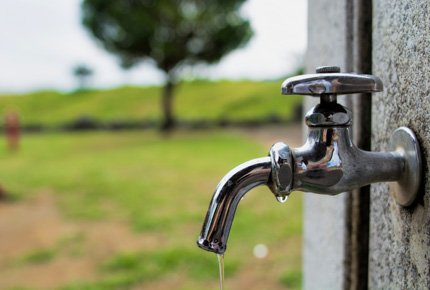Empty clouds, leaking pipes and bucket showers
LAU demonstrates the potential of wastewater reuse at a time when not only depleted underground water, a lack of dams and mismanagement of resources have created a severe water deficit in Lebanon, but this year’s low rainfall has also compounded the problem.

LAU took a step in support of wastewater reuse seven years ago with its first water treatment plant.
Despite our 16 rivers and many mountains, Lebanese residents this year have reverted to taking bucket showers or paying hefty additional bills to buy water as a result of the dire shortage that has left many homes dry for days on end. With this year’s rainfall at less than 50 percent the annual average, the government has only been able to provide for half the daily consumption usually needed for the country’s capital.
Another reason behind diminishing water supplies is the lack of snow that replenishes the country’s streams. This was particularly evident on the slopes this year. “The Mzaar slopes were open for only two days this season, compared to almost 90 last year,” Roland Sayegh, founder of SkiLeb.
He doesn’t however believe that the threat is permanent. “We hear a lot of talk about the effects of climate change, but on the ground we usually enjoy cold snow-filled winters. This year is simply an exception.”
LAU professor of microbiology and biotechnology Dr Fuad Hashwa is less optimistic. “We have to start thinking and acting seriously, as this may not be just an emergency situation but rather a developing trend possibly due to climate change.”
At a recent briefing, Lebanon’s agriculture minister, Akram Shehayeb, spoke about the country’s diminishing underground water sources, wasted surface water and the possibility of desalination as a solution.
While desalination has been adopted in many oil-rich Gulf States, it is an unlikely solution to Lebanon’s woes. The process requires huge amounts of energy, of which the country’s residents already suffer a considerable shortage. “Lebanon should be the last country in the Middle East to resort to desalination,” says Hashwa. “The problem here is not water scarcity but rather water mismanagement.”
A report by the Beirut-based Arab Forum for Environment and Development concurs, noting that water efficiency in the country’s agriculture sector, which uses 80 percent of the country’s water supply, is only 40 percent.
While building more dams would enable Lebanon to trap and use more rainwater, an approach Shehayeb said would now be a top priority, minimizing use of scarce water resources can be achieved by the reuse of water such as that generated from showers and kitchen sinks. Known as ‘grey water’, it accounts for 70 percent of domestic wastewater.
LAU acknowledged the potential for wastewater reuse seven years ago with its first water treatment plant. “We are working toward a capacity of treating 210 cubic meters of grey water per day,” says Georges Hamouche, LAU’s assistant vice president for facilities management. “We are an educational institution working toward raising awareness among our students and in the country as a whole,” he explains. The treated water is used for irrigation at the LAU campus in Byblos.
With demand for water expected to increase by 20 percent over the coming decade, urgent action is needed, now more than ever. Holding no punches, Shehayeb, who previously served as environment minister, said that “the need is certain” and warned that “drought will extend to desertification”.
More
Latest Stories
- On Point Celebrates Student Innovation and Commitment to Accreditation
- LAU Kicks off the Seventh Season of the Jr. NBA League
- Bridging Policy, Science and Society to Tackle Lebanon’s Environmental Challenges
- Understanding a Core Security Gap in Drone Operations
- LAU’s AKSOB Hosts a Timely Debate on Digital Banking and the Future of Finance
- LAU Study Maps Antibiotic Resistance in Lebanese Wastewater
- LAU Builds New Bridges to Lifelong Learning
- Monitoring Poverty in a Data-Deprived Environment

